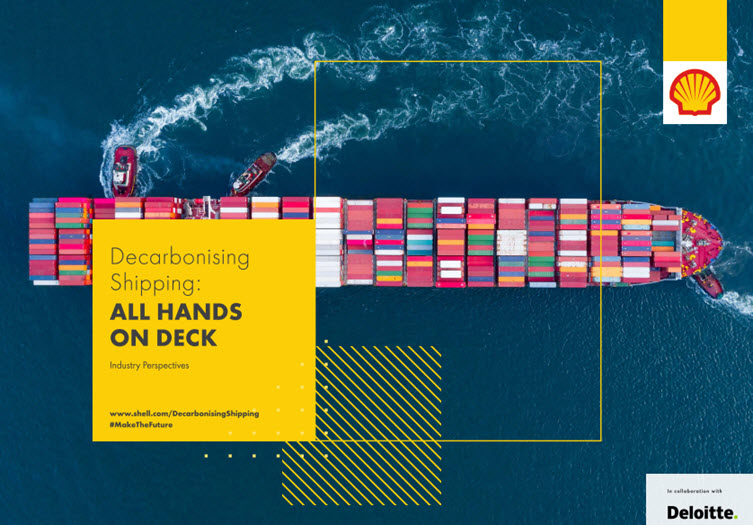
‘Setting Shell’s Course’ highlights the important role that hydrogen and fuel cells could play in decarbonising shipping
‘All Hands on Deck’ is a joint report with Deloitte that outlines industry perspectives of how to accelerate decarbonisation of the shipping sector. ‘All Hands on Deck’ presents 12 recommendations for action, drawn from the views of 80 senior shipping executives, representing 22 countries and almost all segments of the industry.
Building on that research, ‘Setting Shell’s Course’ highlights the important role that hydrogen and fuel cells could play in decarbonising shipping, and sets out Shell’s ambition for a net-zero emissions sector by 2050.
Why decarbonise?
Shipping is the backbone of the global economy. It is by far the most efficient mode of freight transport and transports approximately 80% of the world’s trade volume, according to the United Nations Conference on Trade and Development (UNCTAD). However, as the industry’s development continues, it generates increasing carbon emissions from shipping.
The International Maritime Organization (IMO) has set an ambition to reduce the carbon intensity of emissions from shipping by at least 40% by 2030, and 70% by 2050, compared with 2008 levels. To achieve this, the shipping industry needs to unite in taking urgent action.
Today, there is an opportunity to create a new paradigm through a set of manageable, practical solutions that could break the deadlock and accelerate decarbonisation. Making this happen requires collaboration within the shipping industry itself, across the broader shipping ecosystem and with other sectors.
This publication builds on the optimism and momentum of the interviewees in the Decarbonising Shipping: All Hands on Deck report published in July 2020 by Shell and Deloitte.
In its new report, Shell considers the potential role of different future fuels. Continuing to build the industry’s understanding of possible future technologies through research and development will be critical. Shell’s analysis points to hydrogen with fuel cells as the zero-emissions technology which has the greatest potential to help the shipping sector achieve net-zero emissions by 2050. Shell will seek to advance its research in this area, as hydrogen is projected to benefit from build-out across other industry and transport sectors, making it potentially more cost competitive than alternative zero-emissions fuels.
Meanwhile the shipping sector cannot simply wait for its zero-emissions fuel to emerge and must also look to bring down and peak emissions as quickly as possible. A zero-emissions fuel is not likely to be available on a commercial scale globally until the 2030s. It is essential that the industry takes action to reduce emissions now with solutions available today. Efficiency gains are vital in all pathways. Solutions such as wind assist, air lubrication, advanced engine lubricants and digital optimisation technologies must all be deployed to close the gap to net-zero emissions as much as possible.
Liquefied natural gas (LNG) can also help lower greenhouse gas emissions today. Compared to heavy fuel oil, from extraction to combustion LNG reduces greenhouse gas emissions by up to 21% for 2-stroke slow speed engines and up to 15% for 4-stroke medium speed engines. It can also be used with fuel cells to aid the development of this key technology. In this way, LNG can play a critical role in helping the industry to lower its emissions today and develop technology for the zero-emissions fuels of the future, while continuing to address methane slippage.
This report sets out how Shell is accelerating progress in its own operations and across the industry.
Shell has set a course guided by its belief that collaboration is essential, and by the IMO principles that shipping’s emissions must be phased out as soon as possible and the sector’s emissions must peak as quickly as possible. A selection of key actions Shell will undertake are to:
- call for the IMO to adopt a clear trajectory to a net-zero emissions shipping sector by 2050;
- develop the experience and standards for use of hydrogen in a marine environment and enable commercial deployment of hydrogen across sectors;
- establish a consortium to develop and trial fuel cells on a commercial deep-sea vessel;
- develop a set of performance standards for application on future new-build vessels for all ship types with the aim to deliver up to 25% emissions savings;
- implement a programme of emissions data collection across Shell’s internationally traded time and voyage charters with the intent to publish annual carbon intensity data;
- double Shell’s existing LNG bunkering infrastructure on key international trade routes by the mid-2020s;
- further build the commercial case for our unique industry offering of carbon neutral lubricants through development of our nature-based solutions portfolio; and
- collaborate deliberately and decisively with those at the leading edge of the transition in the sector in order to accelerate decarbonisation. This will include, for example, working within the Getting to Zero coalition, and developing an industry-based coalition covering the entire value chain for US and Canadian cabotage shipping operations.
Shell is setting its course to help accelerate the shipping sector’s decarbonisation pathway. There is no single technology which will achieve this, and it will be a multi-decade journey. Consequently, Shell’s response will evolve over time. But today, this report seeks to stimulate the opportunities and partnerships needed within the industry so Shell can be most effective in working with its customers and partners on a net-zero emissions future.
Download the report at shell.com/DecarbonisingShipping
Source: Shell
Read the most up to date Fuel Cell and Hydrogen Industry news at FuelCellsWorks




